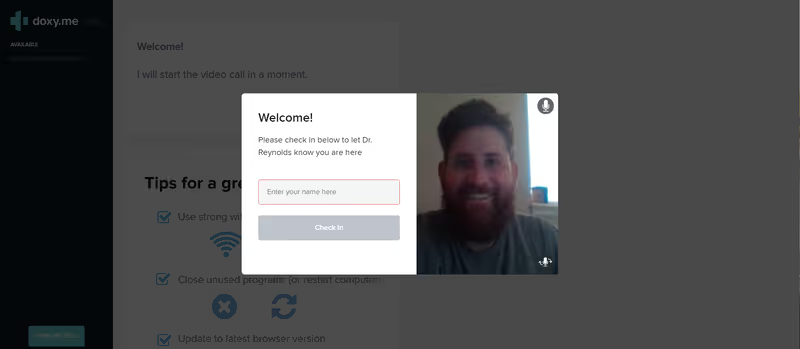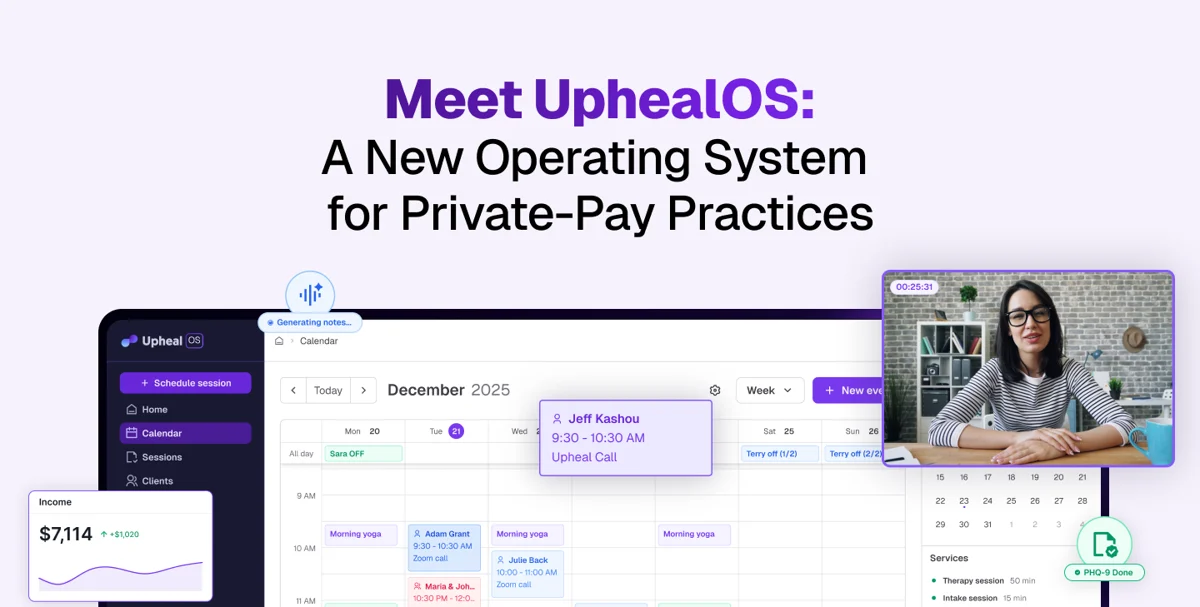Best teletherapy platforms for therapists [2025]
![Best teletherapy platforms for therapists [2025]](https://cdn.prod.website-files.com/6328c07d72b05347cc236c49/68bb296a0a57158be728e9ba_best%20teletherapy%20platform%20for%20therapists.avif)
Between dropped video calls, insurance billing nightmares, and privacy concerns about AI training on client conversations, choosing the right platform feels like navigating a minefield.
After analyzing extensive practitioner feedback and platform capabilities, five platforms consistently demonstrate the depth needed for professional practice:
But here's what matters: these aren't just video conferencing tools with therapy labels slapped on. Each represents a fundamentally different philosophy about how technology should support clinical work.
What to look for in a teletherapy platform
💰 Cost structures beyond the monthly fee
Platform pricing tells a story about who they're built for.
Some platforms charge per active client — seemingly reasonable until your thriving practice hits 40 clients and costs explode. Others offer flat rates that include features you'll never touch.
The most sustainable platforms align their pricing with practice growth, scaling costs predictably as revenue increases.
Consider this: a therapist seeing 25 clients weekly at $0.49 per session (Blueprint's model) faces over $600 annually in session fees alone.
Meanwhile, platforms offering unlimited sessions for fixed monthly rates provide cost certainty that enables financial planning.
💔 Core telehealth performance that preserves presence
A frozen screen during a breakthrough moment doesn't just disrupt technology — it ruptures therapeutic presence.
Platform reliability extends beyond technical specifications. It's about maintaining the subtle nonverbal cues that inform clinical intuition.
When clients shift uncomfortably or tears well up, you need crystal-clear video that captures these crucial moments.
The best platforms deliver consistent quality even when internet connections waver.
🔒 Privacy beyond HIPAA checkboxes
HIPAA compliance is baseline, not exceptional.
The real privacy conversation starts with how platforms handle your session data after the call ends.
Some platforms default to using de-identified transcripts for AI training — meaning your client's words might shape another therapist's AI assistant.
Others require explicit opt-in consent before any data touches machine learning systems.
This distinction matters profoundly. As venture-funded companies actively purchase therapeutic conversations to train chatbot replacements, your platform choice directly impacts the profession's future autonomy.
📑 Practice management that reclaims evenings
Administrative burden is therapy's hidden tax.
Effective platforms transform repetitive tasks into automated workflows.
Automated appointment reminders that reduce no-shows by 30%. Insurance verification that catches eligibility issues before sessions. Client portals that collect intake forms while you sleep.
These aren't conveniences — they're the difference between sustainable practice and burnout.
🧠 Clinical tools that respect your approach
Documentation should amplify your clinical voice, not standardize it.
Whether you practice EMDR, psychodynamic therapy, or integrate multiple modalities, your platform should adapt to your methodology.
Advanced features like AI-assisted progress notes can transform 30-minute documentation sessions into 5-minute reviews — but only if they understand therapeutic language and preserve your unique clinical perspective.
Platform comparison at-a-glance
1. TherapyNotes
TherapyNotes exemplifies what happens when developers actually understand clinical workflow.
⭐ Where TherapyNotes excels
The platform's standout feature isn't flashy — it's fundamental: video quality that doesn't fail when you need it most. While competitors struggle with connectivity, practitioners consistently report clear, stable sessions that preserve therapeutic presence.
This reliability extends throughout the platform. Purpose-built note templates understand therapeutic language. AI-assisted documentation recognizes clinical terminology.
The ePrescribe feature — rare among therapy-focused platforms — integrates seamlessly with the documentation workflow.
Every element reflects deep understanding of mental health practice. The platform doesn't just digitize paper processes; it reimagines them for digital efficiency while preserving clinical integrity.
⚠️ TherapyNotes' limitations
Customization flexibility remains surprisingly restricted.
Practitioners report frustration with fixed appointment reminder timing and inability to schedule availability changes in advance. The absence of direct client messaging forces communication through external channels — adding unnecessary complexity to routine interactions.
The learning curve also deserves consideration. While ultimately powerful, new users often require weeks to fully leverage the platform's capabilities.
👉 Ideal for: Practices prioritizing documentation excellence and telehealth reliability over maximum flexibility.
2. SimplePractice
SimplePractice attracts therapists who refuse to compromise their unique clinical approach for software convenience.
⭐ SimplePractice's strengths
The platform's customization depth is remarkable.
From intake forms to progress notes, virtually every element bends to your preferences. This isn't surface-level theming — it's fundamental adaptability that respects diverse therapeutic approaches.
The all-in-one integration eliminates tool-juggling. Paperless intake feeds treatment planning.
Automated billing processes payments overnight. The secure portal manages everything from scheduling to document sharing.
When it works, it's elegant.
⚠️ The connectivity challenge
Here's where elegance stumbles: telehealth reliability.
Multiple practitioners describe "frequent disconnections" that shatter therapeutic momentum. For a platform positioning itself as comprehensive, this core instability creates significant friction.
Some practices work around it with external video platforms — defeating the all-in-one promise.
Recent comparisons with other platforms highlight how SimplePractice's approach to data privacy also raises questions, with session transcripts potentially used for AI training by default — a consideration for privacy-conscious practitioners.
👉 Ideal for: Practices valuing customization above all, with backup plans for connectivity issues.
3. Ensora Telehealth (formerly TheraNest)
The transformation from TheraNest to Ensora Health signals more than rebranding — it's a fundamental expansion of capability.

⭐ Ensora's evolved strengths
The platform now integrates seamlessly with Ensora Health's broader ecosystem, providing specialized tools for CCBHC compliance, group therapy management, and substance use recovery documentation that other platforms overlook.
Customization runs deep. Create custom forms, workflows, and templates matching your exact needs. The color-coded calendar with intuitive rescheduling reduces administrative friction. Real-time insurance eligibility verification eliminates billing surprises before they happen.
Particularly valuable: automated reminders that practitioners report reduce no-shows by up to 30%. That's not convenience — it's revenue protection.
⚠️ Understanding Ensora's trade-offs
Advanced features demand investment — primarily time.
With only two pre-built note templates, practitioners must create their documentation structure from scratch.
Treatment plans and intake forms lack the flexibility found elsewhere in the platform. The learning curve for advanced features typically spans several weeks.
Caseload-based pricing can escalate quickly. High-volume practices might find costs substantial, especially with additional billing service fees.
👉 Ideal for: Practices serving specialized populations or pursuing CCBHC certification, willing to invest setup time for long-term customization benefits.
4. Doxy.me
Doxy.me operates on the concept that, sometimes, less is more.
⭐ The power of simplicity
Zero barriers. No downloads. No account creation for clients.
Doxy.me operates entirely through web browsers, eliminating every possible friction point between clients and care.
The free HIPAA-compliant version includes a Business Associate Agreement — providing solo practitioners enterprise-level security without enterprise-level costs.
This simplicity extends to device flexibility. Any device with a camera becomes your therapy office.
For practitioners with established practice management systems, Doxy.me provides the missing video component without forcing migration.

⚠️ When simple becomes limiting
Sometimes, less is more. But other times, less is just… less.
Without integrated scheduling, billing, or documentation, practitioners maintain separate systems for practice management.
This creates potential inefficiencies and data silos that comprehensive platforms avoid.
Performance depends entirely on internet quality. Users explicitly warn that weak connections result in poor call quality — a significant limitation for practitioners or clients in areas with unreliable infrastructure.
👉 Ideal for: Budget-conscious solo practitioners needing reliable video without practice management, or those supplementing existing EHRs.
5. Spry PT
Spry PT targets practices ready to consolidate their entire technology stack into one premium solution.
⭐ Spry PT's unified vision
Smart Charting represents genuine innovation in documentation.
Rather than forcing rigid templates, it adapts to your documentation style while ensuring compliance.
The integration between EHR, billing, scheduling, and telehealth feels genuinely unified — not loosely connected modules masquerading as integration.
This architectural coherence eliminates the data inconsistencies and workflow interruptions plaguing cobbled-together solutions.
⚠️ Evaluating the investment
At $150 per provider monthly for EMR plus $100 for billing dashboard, Spry PT demands serious financial commitment.
Their marketing promises comprehensive features, but there isn't much feedback online around real-world performance, support quality, and actual versus advertised functionality.
👉 Ideal for: Well-funded group practices ready for premium, comprehensive solutions.
Best telehealth platform by practice
Best telehealth platform for solo therapists
Your priorities will point you toward the best telehealth platform for your practice:
- For documentation excellence and telehealth stability, TherapyNotes justifies its investment through reliability and purpose-built features.
- Does customization matter most to you? SimplePractice offers unmatched flexibility — just maintain backup video solutions.
- Building your practice? Start with Doxy.me's free tier while establishing revenue, then migrate to comprehensive platforms as growth demands.
Best telehealth platform for group practices
Multiple providers multiply both opportunities and complications.
- TherapyNotes and SimplePractice both offer robust multi-user features, but TherapyNotes' superior stability might prove decisive when technical issues compound across providers.
- Ensora Telehealth becomes particularly compelling for specialized populations or CCBHC pursuit, where its targeted features provide unique value.
- Spry PT warrants consideration for practices ready to consolidate, though thorough due diligence on real-world performance remains essential.
Integrating with other tools
Your platform doesn't operate in isolation.
Modern AI documentation tools like Upheal complement traditional EHRs by addressing specific gaps. While SimplePractice struggles with connectivity, Upheal's free telehealth platform focuses on session intelligence — generating AI clinical notes that capture therapeutic nuance while maintaining industry-leading privacy standards.
For Doxy.me users, Upheal's Golden Thread feature weaves treatment continuity across sessions, solving documentation gaps without requiring platform migration.

This hybrid approach — combining specialized tools rather than accepting all-in-one compromises — increasingly defines sophisticated practice management.
Making your decision
Platform selection transcends feature comparison — it's about aligning technology with clinical values.
Each platform embodies different priorities. TherapyNotes prioritizes stability and clinical depth. SimplePractice maximizes customization. Ensora Telehealth serves specialized needs. Doxy.me champions simplicity. Spry PT promises comprehensive integration.
Your evaluation framework:
- Financial sustainability: Immediate costs versus long-term scalability
- Clinical alignment: Whether documentation, customization, or simplicity drives your practice
- Technical requirements: Stability versus feature breadth trade-offs
- Privacy philosophy: Default data usage versus explicit consent models
Start with trials. Test with actual sessions, not demos. Pay attention to friction points — minor annoyances compound exponentially when repeated daily.
The big picture
This decision impacts more than efficiency — it shapes how therapy evolves in the digital age.
As AI companies actively purchase therapeutic conversations for training chatbot replacements, your platform choice becomes an ethical stance. Selecting partners who respect both time and privacy isn't just good practice — it's essential for preserving the profession's autonomy.
The right platform feels like an extension of your clinical work, not another system to manage. It should enhance your ability to be present with clients, not create new anxieties about technology or privacy.
Choose partners who understand that efficiency without ethics isn't progress.
In an era where technology views therapeutic conversations as training data, protecting the sacred space of therapy becomes our collective responsibility.












